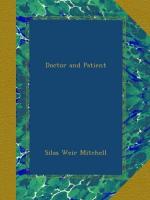As a girl grows older, we ask and expect some measure of restraint in emotional expression as regards any of the physical or moral troubles which call out tears in the child; for the woman who is wise understands that unrestrained emotion and outward expressions of pain or distress are the beginnings of that loss of self-rule which leads to habitual unrestraint, and this to more and more enfeeblement of endurance, and this, again, to worse things, of which more in the future.
We are dealing now with pain. My simple practical thesis is that pain comes to all soon or late, that the indirect consequences are most to be feared, and that endurance in the adult, rational endurance, must be won by a gradual education, which can hardly begin too early. But of what use are these stern lessonings in the bearing of what none can quite escape? Do they enable us to diminish pain or to feel it less? Indirectly, yes. One woman cries out for instant easement if in pain or distress, unschooled to endure. She claims immediate relief. Another, more resolute, submits with patience, does not give way, as we put it, tries to distract her attention, knowing that even as distinct suffering as toothache may be less felt in the presence of something which interests the mind and secures the attention. Nothing, indeed, is more instructive than to watch how women bear pain,—the tremendous calamity it is to one, the far slighter thing in life it is to another. I speak now of transient torments. When we come to consider those years of torture which cruel nature holds in store for some, no one blames the sight of the moral wreck it is apt to make of the sufferer. On the other hand, there is nothing I ever see in my profession so splendid as the way in which a few, a rare few, triumph over pain, which we know must often rise to the grade of anguish, and from which scarce a day is ever free.
I recall well one woman who for years, under my eyes, was the subject of what, with due sense of the force of the word, I call torture. At times she shut herself up in her room, and, as she said, “wrestled with it.” This happened every day or two for an hour or more. The rest of the time she was out, or busy with her duties, but always in some pain. Meanwhile, although failing slowly, she was the life and joy of many, the true and gentle counsellor, the sure support of all who leaned on her for aid. At her dinner-table, in chat with friends, or over a book, no one who did not know her well could have dreamed that she was in such pain as consigns lower natures to disability. Her safeguard from utter wreck was a clear and resolute faith, a profound and unfailing interest in men and things and books, which gave strange vigor to her whole range of intellectual activities. But above all she possessed that happiest of gifts, the keen, undying sense of the humorous, the absurd, the witty. As she once said, “All life laughs for me.” It followed her to death, as it has certain others




